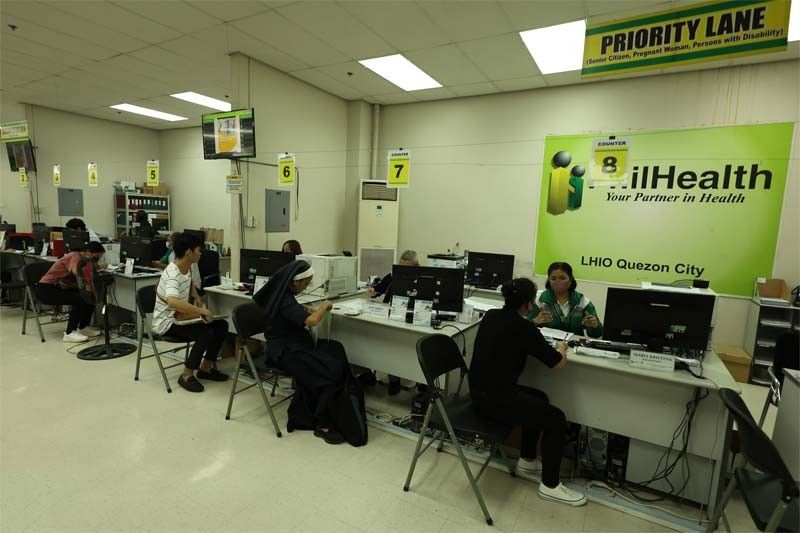Suspension of PhilHealth contributions sought for minimum wage earners

MANILA, Philippines — An economist-lawmaker from the House of Representatives has proposed to suspend the Philippine Health Insurance Corp. (PhilHealth) premium contributions of all minimum wage earners to increase their take-home pay.
In House Resolution No. 1595, Marikina 2nd District Rep. Stella Luz Quimbo said that suspending the premium payment of minimum wage non-agriculture workers in the National Capital Region, for instance, would result in additional P400 increase in their daily salary.
“The PhilHealth contributions of minimum wage earners (should) be temporarily suspended pending a review of the expansion of PhilHealth benefits and reduction of their premium contributions,” Quimbo added.
She noted that PhilHealth could utilize its “unspent appropriations” for premium subsidies, thus providing “immediate financial relief to the country’s economically vulnerable workers.”
The resolution cited that in 2022, Congress allocated P80 billion to subsidize the premium of indigent families, senior citizens and persons with disability with PhilHealth.
The benefit claims for this sector, however, reached only P56 billion, resulting in a net flow of P24 billion.
Quimbo said that PhilHealth’s financial reserves were expected to reach P463 billion in 2023, marking a 68-percent increase from the previous year.
This surplus has accumulated from premiums collected from members, as well as subsidies from Congress that have remained unspent.
“The unspent premium of PhilHealth can very well cover the premium contributions of minimum wage earners for at least a year since in 2022, their premium contribution only amounted to P19.6 billion,” Quimbo said in a statement.
She added that the surplus suggests that PhilHealth can afford to suspend premium contributions for minimum wage earners without compromising its financial stability.
The unspent funds, originally designated for the health coverage of senior citizens and the poorest segments of the population, highlight an opportunity to redirect resources temporarily to alleviate the financial burden on minimum wage earners, according to the lawmaker.
The resolution also seeks to reassess PhilHealth’s benefit packages and the premium contribution rates as provided by the Universal Health Care Law.
It also aligns with the national government’s goal of expanding social protection, particularly to minimum wage earners.
Quimbo added that the goal is to expand “health benefits for all members and potentially reform the contribution structure, or even to possibly eliminate premiums for minimum wage earners and self-employed individuals earning the equivalent of minimum wages.”
The resolution, which is aligned with the call of Speaker Martin Romualdez for PhilHealth coverage to have bigger share in the medical bills and doctor’s fees for patients in private wards, also seeks to design benefit packages focused on illness prevention and improved hospitalization support.
“The aim of the review is to have benefit packages that are designed to prevent illnesses and to provide more support when hospitalized. In the long run, it is cheaper to prevent than to cure,” Quimbo said.
Reservation
Meanwhile, an alliance of patient groups has expressed reservation to the proposed increased PhilHealth coverage for private hospital admissions, saying it could lead to the state health insurer’s bankruptcy.
Though it welcomed the proposal, the Philippine Alliance of Patient Organizations (PAPO) said that there is still a need to carefully study this proposal, especially the issue of funding.
“The proposal to reduce out of pocket expenses for patients confined in private hospitals is something that the Philippine Alliance of Patient Organizations welcomes and supports but there is a need to closely study how this will be funded,” PAPO president Karen Villanueva said in an interview.
Villanueva warned that this move could possibly lead to PhilHealth’s financial collapse.
“We don’t want to drive PhilHealth into insolvency because it is our national insurer. Safeguards should be put in place both on the provider side (hospitals) and the patient side,” she said.
“On the provider side, there needs to be greater standardization of costs and fees so patients and their families can prepare for their medical bills,” she added.
Villanueva noted that safeguards are needed to prevent fraud and overutilization of inpatient care.
“It is a great concept because the intent is to reduce out of pocket expenses which PAPO fully supports but we need to remember that someone needs to pay for all these. We also need to manage costs on the supply side meaning hospitals and doctors’ fees,” she said.
She added that patients are oftentimes surprised during payment time because of the high cost of hospitalization.
“They are faced with bill shock because the costs are something they did not expect. There is in reality no standard fees that patients can expect such as doctors’ fees, which are based on the patient’s room rates rather than their usual consultation fee,” she said. — Rhodina Villanueva
- Latest
- Trending






























